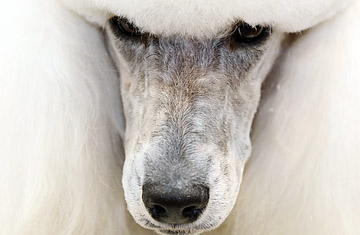
A poodle during the canine groomer contest at the Dog 2010 dog fair in Winterthur, Switzerland
They may not be meowing, barking or mooing their way through depositions anytime soon, but if Switzerland's animal-rights activists get their way, domestic creatures may be given the constitutional right to be represented by (human) lawyers in court.
Swiss voters will go to the polls March 7 to decide whether each of the country's 26 cantons (similar to states) should be obligated to appoint a special attorney to represent pets and farm animals in court in cases of alleged abuse. The initiative is just one of many put before the electorate every year in Switzerland's unique brand of direct democracy, in which anyone can bring an issue up for a vote provided he or she has enough signatures on a petition. While some may grumble that the initiatives are, at times, trivial — animal lawyers being the exception, of course — the ability to decide on matters of national importance is a source of great pride for the Alpine nation, which holds more direct popular votes than any other country. In fact, in studies of public perceptions of the country conducted annually by Credit Suisse, respondents typically say that democracy is more representative of Switzerland than chocolate, watches and banks.
The two pillars of this centuries-old voting tradition are initiatives and referendums. An initiative is a proposed amendment to the constitution, which can be brought to a national vote only if the sponsors gather 100,000 signatures. (For the animal-lawyers initiative, supporters collected 144,000 signatures.) A referendum, which requires just 50,000 signatures, is a vote on whether to accept or reject laws made by parliament, like when the public overwhelmingly approved the decision to renew Switzerland's heroin-distribution program in 2008. "They are powerful instruments for launching new laws and correcting policies, and they are an integral part of our culture," says Andreas Auer, director of the Centre for Research on Direct Democracy in the town of Aarau. "The federal government has learned to adapt to and live with this system. And while more than half of popular votes are favorable to its views, there remains a margin of uncertainty that is healthy to a truly democratic government."
As proud as the Swiss are of their direct democracy, though, some have expressed concerns that the system can be abused by right-wing extremists seeking to push through anti-immigrant proposals. Last year, for instance, the Swiss People's Party (SVP) sponsored an initiative to ban the building of minarets on mosques — a proposal opponents decried as anti-Muslim and hateful. The ban was approved by more than 57% of voters, but there's been talk among Muslim groups about challenging it in court. The Swiss parliament can declare an initiative invalid only if it violates international law. This last happened in 1996, when legislators halted an SVP initiative calling for the deportation of asylum seekers to their countries of origin.
The other problem, according to Georg Lutz, a Swiss politics expert at the Social Science Research Center in Lausanne, is that "even the most ridiculous issues" can be forced on the electorate, as was the case in 1996 when a proposal was put forth to abolish federal subsidies for parking spaces near train stations. A few years ago, a joke made the rounds that an initiative should be held on whether to raze the Alps so the Swiss people could see the ocean. (Regrettably for beach lovers, this never came to pass.) Joking aside, experts say the countless ballots can lead to voter fatigue — Switzerland has long had one of the lowest voter-turnout rates in Europe. Indeed, even one of the most politically charged initiatives in recent years, the minaret ban, saw a mediocre turnout of 55%.
Not everyone would consider the animal-lawyer initiative frivolous, however. Proponents say the current laws dealing with animal abuse aren't strong enough to secure convictions against those suspected of cruelty, so having a court-appointed lawyer act on the behalf of animals makes a lot of (horse) sense. "Humans accused of animal cruelty can hire a lawyer or get one assigned, but animals cannot," Antoine Goetschel, an animal-rights advocate and lawyer, told London's Sunday Times. "Which is where I come in."
The government is against the proposal because cantons are already required by law to have a special office dealing with animal abuse, which it deems protection enough. Farmers associations and pet breeders are also opposed to the initiative, fearing greater scrutiny of their activities. A group called No to the Useless Animal Lawyers' Initiative has been set up to urge voters to reject the proposal.
As always, it will be left to the voters to decide. According to early polls, it looks likely that pet lovers will prevail — a full 70% supported the initiative in a survey released in November. A victory, proponents would argue, for direct democracy.
